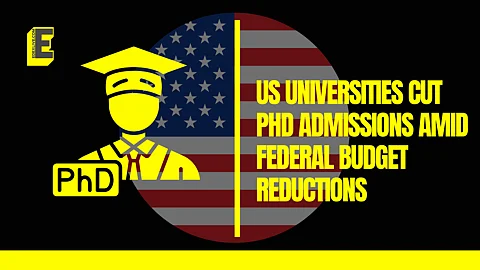

Amid ongoing federal budget cuts, many universities in the United States (US) have been forced to scale back or freeze PhD admissions, a move that is already impacting students, early-career researchers, and academic programmes. As institutions prepare for an uncertain future, the severe reduction in federal funding threatens to reshape the landscape of higher education.
The Economic Times reported that the policy changes introduced by the Trump administration have triggered widespread concern within the academic community.
Just a month into office, the administration implemented measures limiting federal research support, including a freeze on federal grant reviews and a proposed 15% cap on indirect funding from the National Institutes of Health (NIH). These cuts directly affect graduate students who depend on federal funding for research, teaching, and living expenses.
According to The Scientist, the funding freeze has left many researchers, including those at the University of California, San Diego (UCSD), grappling with an uncertain future.
Universities reduce graduate admissions
With grants delayed and funding uncertain, UCSD’s Biological Sciences programme has reduced its PhD admissions by 30%, cutting eight positions from its usual 25-person intake. Kimberly Cooper, Associate Director of the programme, emphasised the difficult decision, stating, “We already decided that we could not continue with business as usual, because we weren’t sure that the funding rate that UCSD has had success with would continue for individual faculty grants to run labs that pay graduate student researchers.”
This issue extends beyond UCSD. Stanford University has also announced a hiring freeze for staff and researchers, citing the “uncertainty about the level of direct federal funding for scientific research.” In addition to concerns over NIH funding, universities are bracing for broader reductions in federal grants, which are crucial for supporting research staff, including graduate students and postdoctoral scholars.
Impact on research and diversity programmes
The effects of these budget cuts extend beyond graduate admissions, affecting postdoctoral researchers and junior faculty members. Researchers are particularly concerned about the future of programmes that support historically underrepresented groups in science.
For instance, Baylor College of Medicine’s Initiative for Maximising Student Development (IMSD) faces potential funding cuts due to the Trump administration’s rollback of diversity, equity, and inclusion (DEI) programmes. With IMSD funding at risk, many fear that opportunities for marginalised students in scientific research could be significantly diminished.
As universities navigate these financial constraints, the broader academic community remains uncertain about the long-term consequences of reduced federal investment in higher education and research, reported the Economic Times.
